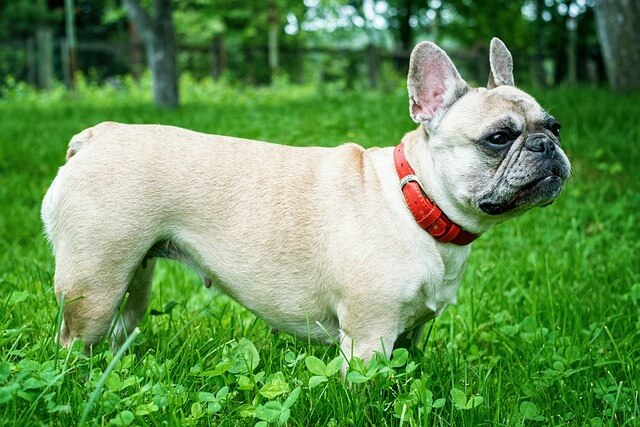French Bulldog: History, Health, Care and Training
The French Bulldog has always been a companion dog. They were bred as a “toy” bulldog by lacemakers in 19th century Nottingham, England, who later immigrated to France, taking their little dogs with them. The Frenchie is a sweet, affectionate dog who makes a wonderful family pet.

History of the French Bulldog
According to history, the French Bulldog was bred from “toy” bulldogs in Nottingham, England by lacemakers who loved the small dogs as lap dogs. Around 1860 these lacemakers immigrated to France and took their dogs with them. Once in France the small toy bulldogs were bred to other small dogs. There were many American ladies and gentlemen traveling in Europe at this time and they noticed these pet dogs in France and became enthralled by them. They insisted on taking the “French Bulldogs” back to America. The American Kennel Club recognized the French Bulldog as a breed in 1898.
Health
French Bulldogs are considered to be a comparatively healthy breed, especially compared to other bulldog breeds. Most Frenchies live 10 to 12 years. Von Willebrand disease does occur in Frenchies, which is a bleeding disorder similar to hemophilia in humans. Breeders can test for vWD and avoid breeding dogs which can pass on the disease. Thyroid problems also exist in the breed but, again, breeders are able to test dogs for this condition and avoid breeding dogs that have the worst problems.
The French Bulldog is a brachycephalic breed (short-nosed) which means that it can have problems handling hot and humid weather. Elongated soft or cleft palates can also be a problem in the breed.
Megaesophagus can appear in the breed. This is a term for several problems with the esophagus.
Frenchies can also have problems with their spine and with back problems. This may be due to the fact that the breed was probably created from dwarf members of the bulldog breeds. Dwarfism is known as chondrodysplasia and this can lead to problems in the Frenchie.
French Bulldogs can also have eye problems such as cherry eye, glaucoma, corneal ulcers, retinal fold dysplasia, and juvenile cataracts. Dogs used for breeding should be CERF-tested prior to breeding. If you have a Frenchie you should clean the folds of skin under his eyes regularly to keep them from holding bacteria or becoming infected.
Temperament and Training
Frenchies are usually gentle, affectionate dogs and they love to be with their families. They are devoted and loving and they want to be with people at all times. The dogs are playful and enthusiastic. They love to be clowns and make people laugh. They won’t allow you to ignore them. Most Frenchies love children but they can play too roughly for some small children so you should always supervise play with small children. Frenchies are small dogs but they can be quite heavy. They can accidentally hurt a small child. You should teach children how to interact appropriately with dogs so kids don’t hurt your dog either.
Although they are a small breed, Frenchies are descended from bull-and-terrier breeds and, as such, they can be quite feisty at times. They don’t always get along with other dogs, especially other dogs of the same sex. If you are planning on having two dogs it’s usually best to have dogs of opposite sexes. They will probably like each other better and you won’t have any problem with them getting along.
Frenchies are usually friendly with new people and they can make very good therapy dogs. They are intelligent, they enjoy learning new things, and they like to please their owners. Training using positive reinforcement (treats and praise) usually works very well with this breed. Frenchies can be good at dogs sports and activities that don’t require a lot of speed such as obedience. They even compete in rally and agility, against dogs of similar size.
These dogs cannot swim because of their head and body shape so be very care with them around water.
Grooming
The French Bulldog requires very little grooming. They have a short, smooth coat that sheds seasonally. It requires regularly brushing. Bathe your dog as needed. The Frenchie is usually a very clean dog and prefers to keep himself clean and neat.
You should clean your dog’s ears weekly to prevent ear infections.
Trim your dog’s nails on a weekly basis to keep them short. If you trim them each week, removing just a small amount of nail, then you won’t cut the quicks or harm your dog.
Special Needs of Care
The French Bulldog can have some respiratory issues that make it dangerous for him to be given anesthesia unless it is absolutely necessary. Make sure your vet is aware of the breed’s special health concerns. The sedative acepromazine, in particular, may be dangerous for your Frenchie.
